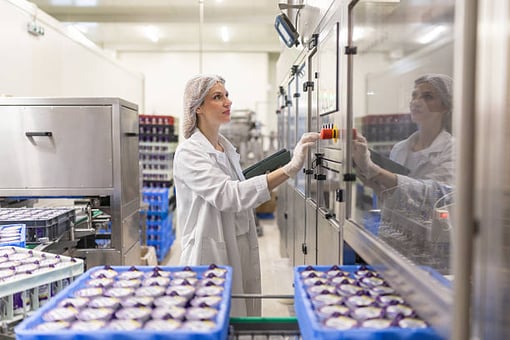
From Farm to Fork: Enhancing Traceability in Food and Beverage Manufacturing through APS Integration
In the food and beverage (F&B) manufacturing landscape, traceability is not just a regulatory necessity—it's a brand imperative. With growing consumer demand for transparency, tighter global food safety regulations, and increasing recalls due to contamination or mislabeling, traceability has become a key operational pillar.
For Plant Managers, ensuring end-to-end traceability—from raw materials to finished goods—is crucial. But achieving this at scale, especially when dealing with multiple product lines, variable suppliers, and shifting consumer demands, requires more than traditional batch records or spreadsheets. It calls for integrated, intelligent systems that provide real-time visibility and control.
That’s where Advanced Planning and Scheduling (APS) systems like PlanetTogether, integrated with ERP platforms such as SAP, Oracle, Microsoft Dynamics, Kinaxis, or Aveva, come into play.
The Importance of Traceability in Food and Beverage Manufacturing
Traceability refers to the ability to track the movement of food products and ingredients through all stages of production, processing, and distribution. It enables manufacturers to quickly identify and isolate issues, minimize risk, and enhance product quality.
For plant operations, the benefits are substantial:
Rapid Recall Readiness: When a recall is necessary, traceability allows for precise identification of affected batches, reducing both time and cost.
Regulatory Compliance: Adhering to FSMA, HACCP, GFSI, and other standards depends on robust traceability practices.
Consumer Trust: Modern consumers want to know where their food comes from and how it's made—traceability empowers transparency.
However, without digital integration and automated planning, traceability becomes a siloed and inefficient process that adds operational drag.
Key Challenges in Achieving Traceability
Despite its importance, F&B manufacturers often struggle with:
Data Silos: Information about sourcing, processing, and distribution often resides in different systems.
Manual Record-Keeping: Many facilities still rely on spreadsheets or paper logs, prone to error and inefficiency.
Complex Supply Chains: Global sourcing and ingredient variability make consistent tracking difficult.
Batch Variability and Customization: As mass customization increases, so do the tracking complexities.
These challenges are exacerbated without integration between planning systems and core platforms like ERP or MES.

PlanetTogether APS: A Traceability Accelerator
PlanetTogether APS, when integrated with ERP solutions like SAP, Oracle, Microsoft Dynamics, Kinaxis, or Aveva, can significantly streamline and enhance traceability across your manufacturing operations. Here’s how:
Lot and Batch-Level Planning Integration
PlanetTogether allows scheduling down to the batch level. When integrated with ERP systems, this capability ensures that every raw material and production activity is time-stamped and traceable. This enhances not only traceability but also batch sequencing and allergen control.
Real-Time Data Synchronization
With two-way synchronization between PlanetTogether APS and your ERP (e.g., SAP or Oracle), you get real-time updates on material consumption, production status, and inventory levels. This live data integration is key to tracking every input and output in the production lifecycle.
Digital Thread Continuity
Traceability depends on a “digital thread”—a continuous, unbroken stream of data from farm to fork. PlanetTogether closes the loop by aligning production schedules with traceable data points across systems, whether from Aveva’s MES or Microsoft Dynamics’ procurement logs.
Exception-Based Alerts for Non-Conformance
By using the APS engine to simulate and flag potential issues—such as expired ingredients or process deviations—plant managers can proactively address risks before they become traceability liabilities.
Boosting Efficiency Alongside Traceability
Traceability is not just about risk mitigation—it also drives efficiency. Through PlanetTogether APS and ERP integration, plant managers benefit from:
Optimized Resource Allocation: Knowing material origins and their expiration windows helps prioritize scheduling.
Reduced Waste: Precise planning reduces the likelihood of expired or misused ingredients.
Better Compliance Reporting: Automatically generated traceability reports cut down on audit preparation time.
Faster Root Cause Analysis: Integrated data accelerates troubleshooting across departments.
Strategic Considerations for Plant Managers
To fully leverage APS-ERP integration for traceability, plant managers should consider:
System Interoperability: Ensure seamless data exchange between APS, ERP, MES, and IoT platforms.
Change Management: Staff training and process standardization are vital when adopting new planning technologies.
Scalability: Choose platforms (like PlanetTogether) that scale with your operations and integrate with leading ERP providers.
Cybersecurity and Data Governance: Secure traceability data to meet compliance and protect intellectual property.
Traceability as a Competitive Advantage
In the food and beverage sector, traceability isn’t just a defensive measure—it’s a strategic asset. As consumer expectations rise and global regulations tighten, the ability to confidently trace, audit, and optimize every step of production becomes a powerful differentiator.
By integrating PlanetTogether APS with systems like SAP, Oracle, Microsoft Dynamics, Kinaxis, or Aveva, plant managers gain not only operational transparency but also the agility to respond to disruptions, ensure compliance, and deliver superior product quality.
In short, traceability—when driven by advanced planning and integrated systems—is not just good practice. It’s smart manufacturing.
Are you ready to transform your traceability capabilities and gain real-time control over your food and beverage production? Explore how PlanetTogether APS integrates with your existing ERP systems to future-proof your operations and safeguard your brand.